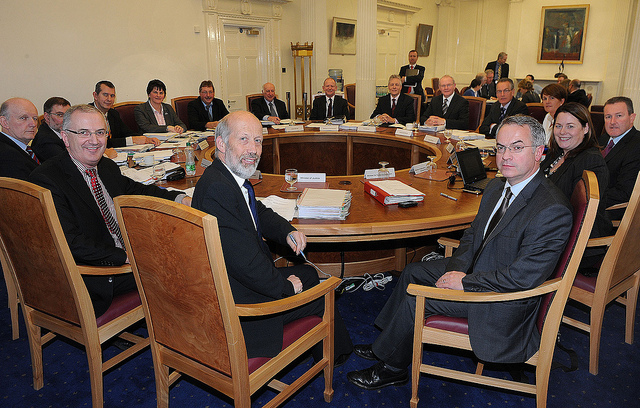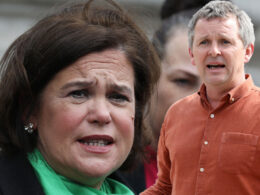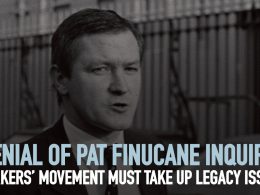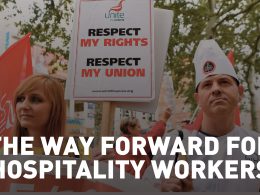By Daniel Waldron and Kevin Henry
While the election in Northern Ireland may, on the surface, seem to have been business as usual, the results suggest that rejection of the sectarian status quo is growing. Opposition to austerity and reactionary social policies found a voice in the midst of the campaign. There are positive pointers towards the opportunities to build an anti-sectarian, working class alternative which may open up in the coming years. However, there were also warnings of the potential dangers and threats facing the working class if such an alternative is not built.
Sectarian pacts
In four constituencies, sectarian competition for the seat saw the development of a pact between the Democratic Unionist Party (DUP) and the smaller Ulster Unionist Party (UUP). This ensured that the DUP’s Nigel Dodds held North Belfast against Sinn Fein. The DUP also reclaimed East Belfast, which they lost to the Alliance Party’s Naomi Long five years ago amidst corruption scandals involving First Minister and then MP Peter Robinson and his wife. Meanwhile the UUP took Fermanagh & South Tyrone, the most keenly contested seat, which Sinn Fein’s Michelle Gildernew won by a margin of just four votes in 2010. UUP leader, Mike Nesbitt, boasted that this election showed “Unionism is no longer on the back foot.” The UUP was bolstered by going from no seats to two, which is at least a temporary reversal of its long-term decline.
The apparent success of this strategy will likely mean that sectarian pacts between parties, either based on the Protestant or Catholic population, become commonplace in future elections, particularly for Westminster. It is clear that an agreed Unionist candidate could also have taken the South Belfast seat from Alasdair McDonnell, leader of the mainly middle class, nationalist Social Democratic and Labour Party (SDLP), who saw a 16% collapse in his vote.
In response to the Unionist agreement, Sinn Fein proposed a similar nationalist pact but the SDLP refused, fearing this would see them lose further ground to their larger rivals. In the wake of the election results, this has led to the SDLP facing sharp criticism, particularly regarding the loss of the knife-edge Fermanagh & South Tyrone seat to the Unionists. The SDLP may be forced to give in to this pressure, meaning the development of two monolithic, sectarian blocs in many areas.
In the run up to the election, all the parties engaged in attempts to ramp up sectarian tension to marshal their support base and turn out the vote – from disputes over the naming of public parks to offensive comments on the Irish language and the ongoing issues of parades, flags and on how to deal with the past armed conflict. Sinn Fein distributed a controversial leaflet in the North Belfast constituency which used census figures showing that Catholics are in the majority in the constituency to argue that they could take the seat, presumably if all Catholics rallied around Sinn Fein against the Protestants. Of course, this is just a particularly naked example of the attempts by the Green and Orange parties to reduce all elections to a sectarian headcount.
Hard-line elements can grow
The Traditional Unionist Voice and United Kingdom Independence Party (UKIP) won over 35,000 votes. While this was a sharp decline from the 100,000 they gained in the European elections last year, it does not suggest that they have been cut across. They de-facto took part in the Unionist pact and were squeezed in other constituencies by the nature of the first-past-the-post system. In this context, their vote was significant and they can pose a real challenge to the mainstream of Unionism in next year’s local Assembly elections. For ideological reasons, candidates reflecting the politics of “dissident” republicanism do not contest Westminster elections. Instead, they made their presence felt through death threats and attacks on the homes of leading Sinn Fein members. Hard-line forces in both communities – both electoral and paramilitary – can grow against the backdrop of rising sectarian tensions and ongoing austerity if an alternative is not posed.
Anger over austerity and homophobia
While the dominant character of this election was that of the usual sectarian headcount, other issues did become central talking points in the campaign, particularly austerity and LGBT rights. This reflects that a latent anger exists in society against the cuts policies being implemented by the parties in the local Stormont Assembly buildings and against the backwardness of the political establishment.
In election TV debates, the party representatives battled to portray themselves as the most effective opponents of austerity. Sinn Fein and the SDLP traded blows on the question of “welfare reform” while the DUP argued they would be in the strongest position to get a deal for Northern Ireland in the event of a hung parliament at Westminster. This was merely empty rhetoric – all five of the main parties are signed up to carrying out austerity policies which will destroy 20,000 jobs and devastate public services. All support the neo-liberal policy of cutting corporation tax – transferring hundreds of millions from public services to the profits of big business – to “rebalance the economy” towards the private sector. However, they clearly feel under pressure to posture on the issue of cuts.
In the course of the campaign, DUP Health Minister Jim Wells was forced to resign amidst a public outcry in response to his homophobic comments, suggesting that same-sex couples are more likely to abuse their children than straight couples. This brought the issue of LGBT rights centre stage in the campaign, as did a vote in the Assembly which saw equal marriage rejected for the fourth time. The UUP’s Danny Kinahan was the only Unionist MLA to vote in favour, which may well have been a factor in him reclaiming the safely Unionist South Antrim seat for the Westminster parliament from the DUP’s religious fundamentalist Willie McCrea. Meanwhile, the ‘liberal’ Alliance Party and the Catholic nationalist SDLP – the party of “civil rights” – were embarrassed by their members either abstaining or failing to show up to vote in favour of equal marriage.
Growing disconnect from the main parties
More people– particularly youth – are completely turned off by the sectarian bickering and the right-wing consensus amongst the main parties. This disillusionment was largely reflected in high levels of abstention – only 58% of registered voters turned out, which is low by the standards of Northern Ireland. If registered non-voters constituted a political party, they would have won 17 of the 18 seats. When those who are not registered are included, a majority did not vote.
This malaise disproportionately affected the nationalist vote. Unionists were able to turn out their vote by portraying the election as a defensive battle against what is seen by many Protestants as an onslaught against their rights and culture, exemplified by the removal of the British Union flag from Belfast City Hall and restrictions on the right to parade. Conversely, since the Good Friday Agreement, which established ‘power-sharing’ arrangements, nationalists have sold the idea that the Catholic community was making headway and would make significant gains both politically and economic. However this rhetoric is losing its ability to motivate voters to turn out in the face of the concrete social and conditions working class people face.
Sinn Fein losing steam
In terms of results, Sinn Fein was hit worst by this growing disillusionment. As Sinn Fein has become increasingly integrated into the political establishment, their activist base has dwindled and they have become more disconnected from their core support. This reflects both anger at the fact Sinn Fein is participating in the carrying out of austerity and a growing perception that they have sold out on republican values. In last year’s local elections, a number of anti-Sinn Fein republican councillors were elected in Sinn Fein heartlands, including open representatives of “dissident” paramilitary groups. The Sinn Fein leadership’s aim to be in government, and potentially the largest party, on both sides of the border in the wake of Assembly and Southern general elections next year – the centenary of the Dublin Easter Rising – could be under threat. However, Sinn Fein may recover on the basis of the internal turmoil within the SDLP, with a public row over the leadership of the party.
Opportunities for the Left
Besides the loss of the Fermanagh & South Tyrone seat, the most humiliating blow for Sinn Fein (and, indeed, the SDLP) was the strong performance of People Before Profit’s Gerry Carroll in the nationalist heartland of West Belfast. Carroll came second with 6,798 votes, a share of almost 20%, while Sinn Fein saw their vote fall 17% compared to 2010. Carroll has built a high profile in the area, and was elected to Belfast City Council last year. He has managed to tap into the disillusionment with Sinn Fein and the anger against the political establishment as a whole, particularly amongst young people who want a radical departure from the sectarian status quo. However, while Carroll’s vote is significant, the one-sided nature of the politics of People Before Profit – and particularly its core component, the Socialist Workers’ Party, which tends to bend to republicanism – can restrict its ability to fill the vacuum which exists.
Others from outside the political establishment also performed well. The Greens – who are seen by many as a radical, anti-sectarian party – gained credible results where they stood. Anti-cuts candidates received 1,500 votes in North Belfast despite the constituency’s sectarian battle royal. This gives a glimpse of the possibilities for anti-cuts, united working class politics which could open up in the next period.
Renewed instability at Stormont
The electoral warning shot across the bow of Sinn Fein could have profound consequences. Sinn Fein twice signed up to “welfare reform” only to backtrack due to concerns about its impact on their support, on both sides of the border. The DUP have now forced the issue firmly onto the Assembly’s agenda, saying that refusal to implement it will necessitate swingeing cuts across public services within weeks. Bruising from the Westminster election, Sinn Fein may refuse to play ball, preferring to grandstand until after the next year’s Assembly elections. This could potentially lead to the suspension of the local ‘power sharing’ institutions and the temporary re-establishment of direct rule from Westminster.
SNP landslide can sharpen sectarian tension
With the return of a Tory majority government, the Northern Ireland parties will not have the influence at Westminster they perhaps hoped for, at least in the short term. However, the results of the election in Britain – particularly in Scotland – can have very significant ramifications in the North. Growth in support for Scottish independence largely reflects a desire to break from the austerity consensus at Westminster. In the absence of a working class alternative, the Scottish National Party (SNP) has captured this mood by posturing to the left while still carrying out austerity at Holyrood. They routed the main parties, especially Labour, taking 56 out of 59 seats in Scotland.
While the Tories committed to devolving more powers to the Scottish parliament, the perception that a Tory government, based largely in the south of England, is imposing further brutal austerity on Scotland can sharpen the national question in Scotland further, potentially putting the question of a second independence referendum back on the table in the near future. This would serve to heighten sectarian tensions in the North of Ireland, feeding fears in the Protestant community that the Union is disintegrating and that they are becoming increasingly isolated, with their backs against the wall. Both Green and Orange politicians would seize upon renewed demands for Scottish independence to engage in sectarian sabre-rattling, including calls for a ‘border poll’ in Ireland.
New mass party of the working class urgently needed
This threat poses the urgent need to build a new anti-sectarian political voice for the working class and youth. The Tories will continue their juggernaut of cuts which will be dutifully imposed by the Stormont parties, if the institutions remain functional. This can provoke struggles which can develop and bring to the surface the latent anger which already exists in society and politicise a new layer of workers and young people and lay the basis for the building of such a party.
Unfortunately, the majority of the trade union movement’s leadership is acting as a block on this process by refusing to lead serious opposition to austerity – for example, failing to call meaningful follow-up action to the significant public strike in Northern Ireland on March 13th – and pursuing political alliances with the Stormont parties, particularly Sinn Fein, which can potentially cause splits and divisions within the workers’ movement.
A serious debate must now be opened up inside the trade union movement and amongst activists as to how this dead-end approach can be defeated and how we can seize the opportunities which will be posed to build a united fightback and a real challenge to the politics of sectarianism and austerity.
Only the building of working class unity around our common interests can break down sectarian barriers and lay the basis for a solution to the national question through the struggle for a socialist society built on respect and solidarity, where the democratic and cultural rights, of all, would be guaranteed.












